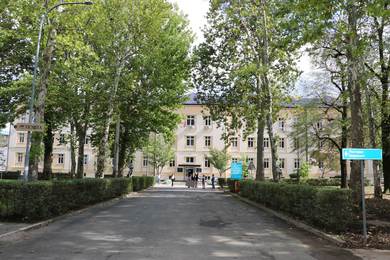
Rectorate
Office of Vice-rector for Teaching, Student Affairs and Quality
Before the University was established, there were 4 952 students enrolled in junior colleges and faculties in Banja Luka. In the University’s first year there were 7 079 students, 3 445 of which with full attendance. A total of 2 356 students enrolled in the first semester that year. During this developing stage, the number of students taking all exams and those who were graduating was on the rise.
From 1980 to 1985 the University introduced some structural changes for the administrative system, and initiated the process of modernization and rationalization of higher education. At the same time, the role of the student in student activity and the teaching process was strengthened, while the accountability of academic staff for the success and quality of the studies was increased. Student enrolment, standards and social activities were given continuous attention. The expansion of the higher education institution network between 1980 and 1985 meant establishing new higher education institutions and new departments in existing faculties.
The period of the University’s development from 1985 to 1992 was very specific and it was characterized by pronounced social and economic changes in the then Socialist Federative Republic of Yugoslavia. Yet, with great effort of the private sector, the authorities, the educational and scientific organizations, progress was achieved in all areas of the University’s development, even leading to investments in equipment at the higher education institutions (computers, laboratories etc.) Scientific research and practical work were slowly being revived and connected to the economy.
The University’s development from 1992 to 1996 was marked by a generally dire situation, the defence patriotic war and the breakup of Yugoslavia, establishment of the Republic of Srpska and post-war social and economic crisis. Warfare hindered the work and development of the University of Banja Luka. All segments of its functioning were hindered, but work still continued. The interest of young generations to study was also impacted by the overall state of affairs in the period, causing a reduced number of students at the beginning of the defence patriotic war. Just before the war broke out, there were a total of 6 758 students in all faculties and junior colleges. In the academic year 1992/93, there were 5 438 students at the University, and from the next year onwards the number of students started gradually rising again. In the academic year 1993/94, enrolment reached the pre-war level of 6 455.
In the academic year 2007/08, the University of Banja Luka started implementing the Bologna process in all study programmes, although some faculties had taken on the Bologna reform even sooner. A three-cycle study system was adopted along with the ECTS system and total study load and the principle of a maximal load of 60 ECTS per year. To facilitate studies and increase exam pass rates, curricula were organized into single-semester course units with segmented testing, in the form of midterm and end-term exams, tests, seminar papers, project tasks etc. The students activity during classes is monitored and graded, encouraging the interactivity of the teaching process. Soon after the Bologna declaration was adopted, activities commenced on quality assurance at the individual University members and have been carried out continuously for the past six years. After the integration of the University, consolidated analyses were initiated. Today, with its 16 faculties, the Academy of Arts, and a research institute, the University of Banja Luka is a medium-sized university, according to world standards. It is one of two public universities in the Republic of Srpska and operates in an environment with lots of competition from private higher education institutions, of which there are seven universities and 10 colleges.
Professor Milica Balaban, PhD
Vice-Rector for Teaching and Student Affairs
Phone: +387 51 321 181
E-mail: prorektor.nastava@unibl.org milica.balaban@pmf.unibl.org
Mirjana Predić, MA
Senior Associate for Teaching and Student Issues
Phone: +387 51 321 180
E-mail: mirjana.predic@unibl.org
Dijana Bilanović
Senior Associate for quality assurance
Phone: +387 51 321 182
E-mail: dijana.bilanovic@unibl.org
